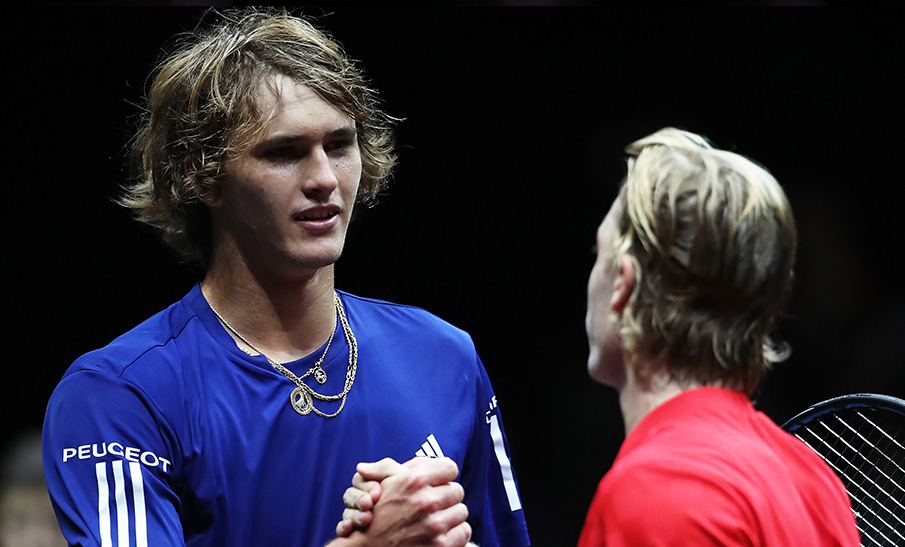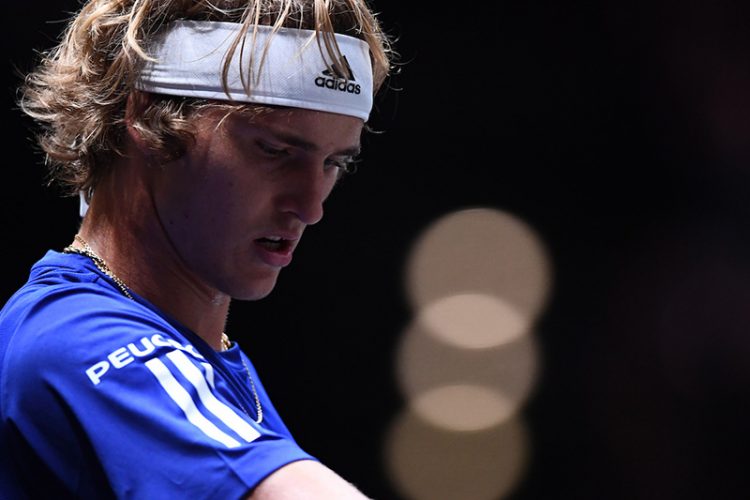
“To understand the present you have to honor the past,” says Roger Federer in a promotional video for the Laver Cup, but what of the future? Well we had a glimpse of the next generation on the opening day of the new team competition, when Alexander Zverev beat the man who could be his major rival over the next 10 years, Denis Shapovalov.
The greatest rivalries offer contrasts in styles, and seldom produce a bad match as a result. Even when one player was not in their best form, Borg and Connors, Borg and McEnroe, Evert and Navratilova, Sampras and Agassi, and Federer and Nadal always served up a very watchable spectacle, and in their two matches to date, the German and the Canadian have shown their ability to do the same.
Zverev followed up his 6-4 7-5 win in Montreal six weeks ago with a 7-6(3) 7-6(5) win to give Team Europe a 3-0 lead and a clean sweep of the singles on the opening day of the Laver Cup. It was 109 minutes of contrasting, enthralling and mostly high-quality tennis, Zverev pitting his powerful groundstrokes against the more angled and net-rushing game of his left-handed opponent.
![“To understand the present you have to honour the past,” says Roger Federer in a promotional video for the Laver Cup, but what of the future? Well we had a glimpse of the next generation on the opening day of the new team competition, when Alexander Zverev beat the man who could be his major rival over the next 10 years, Denis Shapovalov. The greatest rivalries offer contrasts in styles, and seldom produce a bad match as a result. Even when one player was not in their best form, Borg and Connors, Borg and McEnroe, Evert and Navratilova, Sampras and Agassi, and Federer and Nadal always served up a very watchable spectacle, and in their two matches to date, the German and the Canadian have shown their ability to do the same. Zverev followed up his 6-4 7-5 win in Montreal six weeks ago with a 7-6(3) 7-6(5) win to give Team Europe a 3-0 lead and a clean sweep of the singles on the opening day of the Laver Cup. It was 109 minutes of contrasting, enthralling and mostly high-quality tennis, Zverev pitting his powerful groundstrokes against the more angled and net-rushing game of his left-handed opponent. The two men’s games are made to bring out the best in each other. Zverev’s game is the current idiom of big forehand, two-handed backhand, and big serve. Shapovalov has a more all-court game, using his racket as a flashing blade on his one-handed backhand, looking to push his opponent as wide as possible, and racing into the net whenever he opens up the court. Shapovalov could well end up with as much variety as Federer and McEnroe, but he’s two years younger than McEnroe was when he won his first Slam, and three years younger than Federer. He will need time. In the end, Zverev’s additional two years made an ocean of difference in a very close match. His experience on the tour, that has delivered him two Masters-1000 titles this year and taken him to No 4 in the world rankings, meant he was more solid on the baseline, and he played the bigger points better. The 20-year-old Zverev played a superb 20-stroke rally at 4-5 30-40 when Shapovalov threatened to snatch the first set. The German was always ahead in the first set tiebreak, and he refused to buckle after missing four match points on the Shapovalov serve at 5-4 in the second. By contrast, the 18-year-old Canadian still has to make better choices about which of his impressive backhands to use – he was a shade slow to get wise to the value of the sliced return – and he threw in a fatal double-fault at 5-5 in the second set tiebreak, allowing Zverev to wrap up victory with an ace. Asked what he’s still lacking compared with Zverev, Shapovalov replied: “His serve is unbelievably difficult to read, and he’s so much more solid from the baseline. There are lots of things I have to improve on, but one of the main ones is to be able to control points from the baseline the way Sascha can.” To both players’ credit, they are not yet talking in terms of a rivalry. “We’ve only played twice,” said Zverev. “Maybe in 10 or 12 years people will look back and say we had a good rivalry, but it’s too early to say that now. Because of our age we’ve only played each other a couple of times. It’s also important not just to talk about me and Denis – there’s Dominic [Thiem] and Nick [Kyrgios] as well, and they could become rivals in time.” Whatever else happens at this Laver Cup, the Prague crowd has already had a look into tennis’s crystal ball – and it should like what it’s seen.](https://lavercup.com/wp-content/uploads/2017/09/GettyImages-851623654-750x500.jpg)
In the end, Zverev’s additional two years made an ocean of difference in a very close match. His experience on the tour, that has delivered him two Masters-1000 titles this year and taken him to No 4 in the world rankings, meant he was more solid on the baseline, and he played the bigger points better.

The 20-year-old Zverev played a superb 20-stroke rally at 4-5 30-40 when Shapovalov threatened to snatch the first set. The German was always ahead in the first set tiebreak, and he refused to buckle after missing four match points on the Shapovalov serve at 5-4 in the second. By contrast, the 18-year-old Canadian still has to make better choices about which of his impressive backhands to use – he was a shade slow to get wise to the value of the sliced return – and he threw in a fatal double-fault at 5-5 in the second set tiebreak, allowing Zverev to wrap up victory with an ace.
Asked what he’s still lacking compared with Zverev, Shapovalov replied: “His serve is unbelievably difficult to read, and he’s so much more solid from the baseline. There are lots of things I have to improve on, but one of the main ones is to be able to control points from the baseline the way Sascha can.”
To both players’ credit, they are not yet talking in terms of a rivalry. “We’ve only played twice,” said Zverev. “Maybe in 10 or 12 years people will look back and say we had a good rivalry, but it’s too early to say that now. Because of our age we’ve only played each other a couple of times. It’s also important not just to talk about me and Denis – there’s Dominic [Thiem] and Nick [Kyrgios] as well, and they could become rivals in time.”
Whatever else happens at this Laver Cup, the Prague crowd has already had a look into tennis’s crystal ball – and should like what it’s seen.